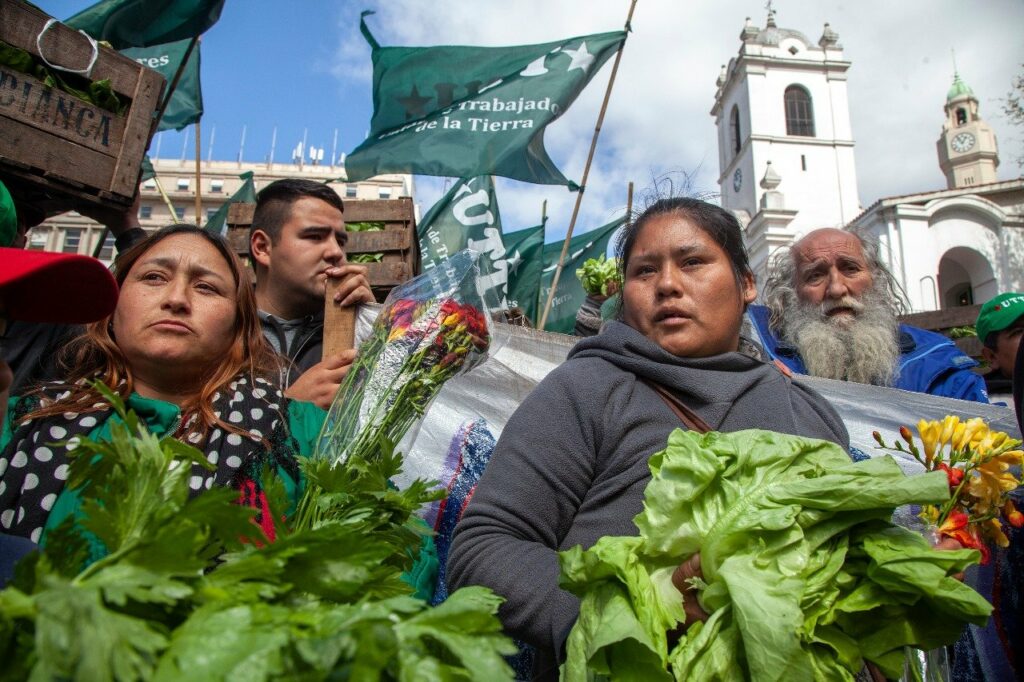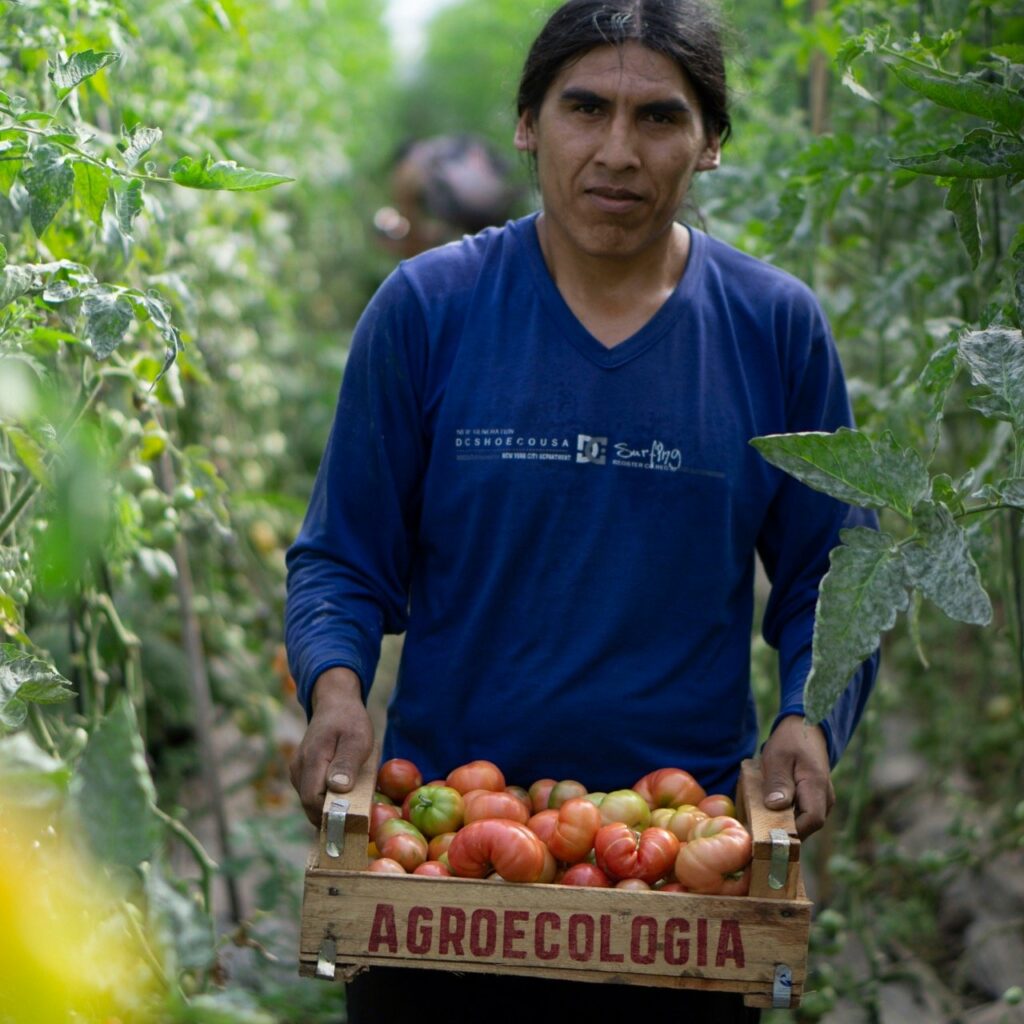The Agroecology Fund recently collaborated with A Growing Culture on five episodes of their Hunger For Justice Series. Launched to highlight the inequities of the industrial food system exposed by Covid-19, these live broadcasts featured agroecology leaders from the AEF grantee network, and sought to amplify their grassroots community-led solutions for resilience.
“The series is a chance to pull people with an environmental focus into the social aspect of the food movement. A lot of the people tuning in are familiar with regenerative agriculture and sustainability but not food sovereignty and agroecology,” says A Growing Culture’s Loren Cardeli.
On August 21, the series featured AEF grantee partner the Unión de Trabajadores de la Tierra, the Union of Landworkers from Argentina. UTT’s gender secretary Rosalía Pellegrini and food sovereignty activist Lucas Tedesco were in conversation with agroecologist and former Food First director, Eric Holt-Giménez.



UTT was formed 10 years ago to give a collective voice to small-scale Argentinian producers. Today, the farmworkers’ union brings together thousands of families from 16 provinces across the country, to organize and advocate for agroecology, access to land, and social transformation. Their campaigns over the past decade demand fairer policies for peasants.
In Argentina, most small producers live in precarity; with no access to land, more than 70% have no choice but to lease the plots they farm on.
“We are the ones who feed Argentina and produce most of the food for our fellow citizens yet we are marginalized and pushed into a grave situation,” said Lucas Tedesco.
Before the Covid-19 pandemic, UTT would typically organize hundreds of grassroots assemblies every month, to advance the agroecology movement and strengthen their resistance to large corporations taking over their territories. Much of the land in Argentina has been turned over to farm soy and corn, destined for animal feed and export. The expansion of these transgenic monocultures drives deforestation across Argentina. “It is a destruction of our territories under corporate control,” said Lucas.
“Agroecology is born from the workers”
Through peasant-to-peasant exchange, UTT promotes agroecology as an alternative to the industrial food system: an alternative that benefits small producers and allows them to restore their relationship with the land. The union’s members believe that patented seeds and the “Monsanto model” curtail people’s rights and sovereignty, putting farmers in debt and eroding the sustainable agricultural practices that evolved over hundreds of years.
“Farmworkers are the ones with the knowledge! Through agroecology we rediscovered so much of our traditional produce and recovered our health,” said Rosalía Pellegrini, gender secretary of UTT.
“We want legitimacy for women farmworkers. We work to combat “machismo” and different forms of gender violence that are prevalent,” said Rosalia. UTT created a group of rural women farmworkers, to promote gender equity in the countryside, and a more feminist perspective in agriculture. “We noticed it was men who kept perpetuating this model of poisoning the earth, killing pests, to get more profit; but we are encouraging each other to take care of our ecosystems,” said Rosalía.
They soon realized that agroecologically grown produce, with its diversity of sizes, shapes and colors, was not always best suited for conventional markets. The farmworkers’ union has created alternative networks to directly supply consumers around the country. UTT collectively decides on pricing, to ensure their fruits and vegetables remain affordable to all. “Agroecology is born from the workers, from the countryside. Healthy food has to be accessible to all of us. Agroecological products should not be turned into a luxury good,” said Lucas.
They have found that this marketing model helps consumers better understand and support food sovereignty, and helps producers live a more dignified life. “It is not just buying a tomato, it is a step towards social transformation,” said Rosalía. Today, UTT has more than 150 marketing “nodes” or points of distribution, 8 agroecological warehouses and several agroecological markets.
During the Covid-19 lockdown, UTT quickly mobilized their networks to lead solidarity actions. As part of their relief efforts, they supplied vulnerable communities with fresh produce and healthy meals. With support from the Agroecology Fund, they are expanding their network of “sovereign food canteens” around the country.
The pandemic made farmworkers across Argentina reflect on what is necessary to live, explained Rosalía. “We are essential workers; structural policies need to recognize that,” she said.
For UTT, agroecology is a political tool to construct a more democratic and equitable system from the ground up: one that is inclusive of women, youth, Indigenous communities, and other marginalized groups. They seek to break ties with the exploitative, industrial model of agriculture and continue to urge the Argentinian government to support the rights of small-scale producers.
“Without agroecology there is no food sovereignty. We would remain enslaved to large corporations with no decision making power for ourselves,” said Lucas.
“UTT demonstrates how key the peasant farmworker sector is when it is organized. It is transformative, not just for farming practices but for society,” said moderator Eric Holt-Giménez, in conclusion.
Watch the full recording on YouTube:
Learn more about AEF’s Emergency Fund grantees here.
Photographs courtesy UTT.
